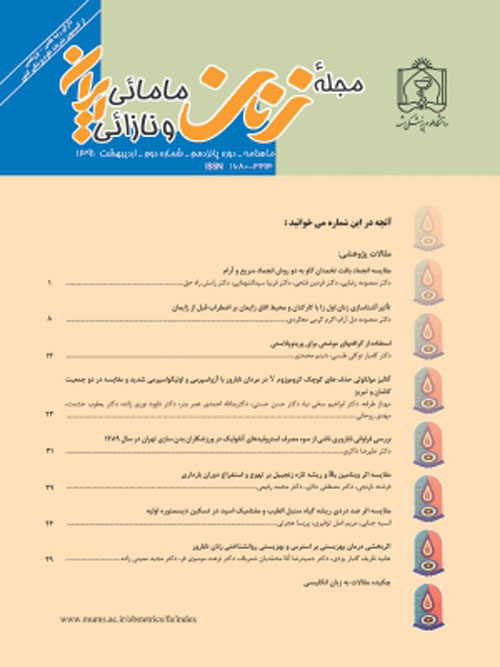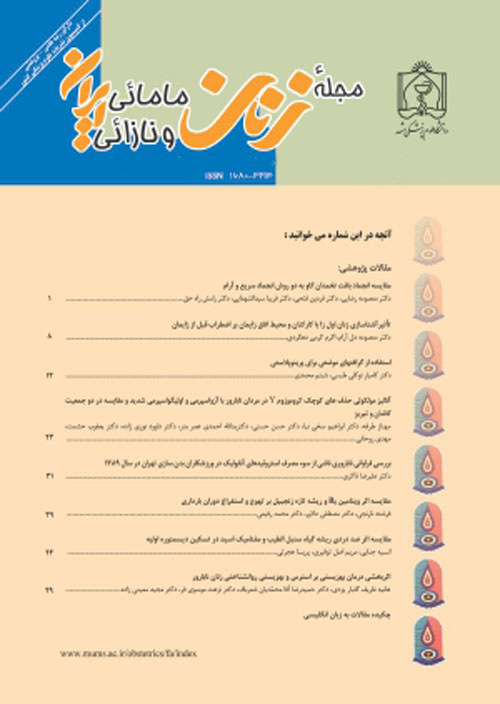فهرست مطالب

مجله زنان مامائی و نازائی ایران
سال نوزدهم شماره 221 (هفته چهارم آذر 1395)
- تاریخ انتشار: 1395/09/30
- تعداد عناوین: 3
-
- اصیل پژوهشی
-
صفحات 1-10مقدمهناباروری به عدم وقوع بارداری به صورت طبیعی طی یک سال یا بیشتر ارتباط جنسی منظم و بدون حفافظت از حاملگی گفته می شود. با توجه به اثرات نامطلوب ناباروری بر زندگی زوجین و با توجه به اهمیت و ضرورت مشاوره در تخمک اهدایی و نبود مشاوره جامع و کامل در مراکز ناباروری، لذا مطالعه حاضر با هدف تعیین تاثیر مشاوره جامع ناباروری و باروری شخص ثالث بر نگرش زنان کاندید تخمک اهدایی نسبت به روش های اهدایی کمک باروری انجام شد.روش کاراین مطالعه کارآزمایی میدانی در سال 1394 بر روی 53 زن نابارور کاندید دریافت تخمک اهدایی مراجعه کننده به مرکز باروری و ناباروری اصفهان انجام شد. افراد به طور تصادفی در دو گروه کنترل و مداخله قرار گرفتند. مشاوره جامع ناباروری و باروری شخص ثالث در گروه مداخله، در 6 جلسه 60 دقیقه ای انجام شد. نگرش زنان نسبت به روش های اهدایی کمک باروری به صورت خودگزارشی و به وسیله پرسشنامه 32 سوالی نگرش نسبت به روش های اهدایی کمک باروری در دو گروه، قبل و یک ماه بعد از مشاوره تعیین شد. تجزیه و تحلیل داده ها با استفاده از نرم افزار آماری SPSS (نسخه 20) و آزمون های تی مستقل، تی زوجی، من ویتنی، آزمون فیشر و کای اسکوئر انجام شد. میزان p کمتر از 05/0 معنی دار در نظر گرفته شد.یافته هابین میانگین نمره کل نگرش نسبت به روش های اهدایی کمک باروری در گروه مداخله قبل از مشاوره (41/5±33/39) و یک ماه بعد از مشاوره (02/5±98/51) و میانگین نمرات 7 بعد آن تفاوت آماری معنی داری وجود داشت (001/0>p).نتیجه گیریمشاوره جامع ناباروری و باروری شخص ثالث (تخمک اهدایی، اسپرم اهدایی، رحم اجاره ای، جنین اهدایی) در زنان کاندید دریافت تخمک اهدایی، باعث بهبود نگرش آنان نسبت به روش های اهدایی کمک باروری می شود.کلیدواژگان: روش های کمک باروری، مشاوره، ناباروری، نگرش
-
صفحات 11-18مقدمهسندرم تخمدان پلی کیستیک یکی از شایع ترین اختلالات غدد درون ریز است که 10-5% زنان سنین باروری را تحت تاثیر قرار می دهد. شیوع فاکتورهای تاثیرگذار بر این اختلال بسیار حائز اهمیت است. بنابراین مطالعه حاضر با هدف بررسی عوامل موثر بر سندرم تخمدان پلی کیستیک در شهر همدان انجام شد.روش کاراین مطالعه مورد- شاهدی از شهریور ماه 1394 تا 15 اردیبهشت ماه 1395 بر روی 120 نفر از زنان مبتلا به سندرم تخمدان پلی کیستیک و 120 زن فاقد این سندرم مراجعه کننده به درمانگاه زنان بیمارستان فاطمیه همدان انجام شد. ابزار گردآوری داده ها شامل پرسشنامه محقق ساخته بود که اطلاعات مربوط به اطلاعات فردی و سبک زندگی افراد گردآوری شد. تجزیه و تحلیل داده ها با استفاده از نرم افزار آماری SPSS (نسخه 21) و آزمون های تی مستقل و کای دو انجام شد. میزان p کمتر از 05/0 معنی دار در نظر گرفته شد.یافته هابر اساس آزمون کای دو، تفاوت معناداری بین افراد مبتلا و غیر مبتلا از نظر وزن، مصرف مکمل، ورزش روزانه، مصرف دخانیات و سطح تحصیلات وجود داشت (05/0p<). بر اساس آنالیز رگرسیون چندگانه، تاثیر وزن، قد بر روی سندرم تخمدان پلی کیستیک از سایر متغیر ها بیشتر بود.نتیجه گیریافزایش وزن، کاهش سطح تحصیلات، مصرف دخانیات، عدم انجام ورزش روزانه و مرتب و عدم مصرف روزانه مکمل (روی، کلسیم، ویتامین D، آهن) در افراد مبتلا به سندرم تخمدان پلی کیستیک بیشتر گزارش شد. بنابراین تعدیل رژیم غذایی و انجام ورزش روزانه و کاهش وزن در پیشگیری و درمان این سندرم ضروری به نظر می رسد.کلیدواژگان: داروی مکمل، سندرم تخمدان پلی کیستیک، شاخص توده بدنی، ورزش
- مروری
-
صفحات 19-30مقدمهاختلالات ناشی از هورمون های جنسی از جمله استروژن، پروژسترون و تستوسترون از جمله اختلالاتی است که باعث ایجاد بیماری های متعددی می شوند. بکارگیری داروها و هورمون های شیمیایی در کنار اثرات درمانی، خود باعث بروز بیماری های ثانویه خطرناکی از جمله سرطان ها خواهند شد. با توجه به رویکرد سازمان جهانی بهداشت به طب های سنتی و مکمل، بکارگیری درمان های ایمن گیاهی در کنترل اختلالات هورمونی می تواند بسیار موثر واقع شود. مطالعه مروری حاضر با هدف مطالعه و معرفی برخی درمان های گیاهی مفید در درمان بیماری های ناشی از اختلالات هورمون های جنسی انجام شد.روش کارمقالات مروری با استفاده از کلیدواژه های اختلالات اندوکرینی، استروژن، پروژسترون، تستوسترون و درمان های گیاهی در بازه زمانی سال 1980 تاکنون در پایگاه های pubmed، scopus،SID و google scholar مورد جستجو قرار گرفتند. ملاک پذیرش مقالات، بیان حداقل یک درمان گیاهی در کنترل سه هورمون مورد نظر بود. در کل، حدود 213 مقاله پیدا شد که از این بین حدود 97 مقاله که ارتباط مستقیم درمان گیاهی با هورمون ها (نه فقط بیماری) را مورد بررسی قرار می دادند، جدا شدند. سپس از این 97 مقاله، حدود 53 مقاله که علاوه بر چگونگی اثر گیاهان، مکانیسم اثر را نیز مورد مطالعه قرار داده بودند، انتخاب شده و در این مقاله مروری مورد بحث قرار گرفتند.یافته هااز جمله مهم ترین منابع گیاهی هورمون های جنسی سویا، red cloverو kudzu برای استروژن؛ Bupleurum، Rehmannia و Passiflora برای پروژسترون و Shatavari، Damiana و Ashwagandha برای تستوسترون می باشد.نتیجه گیریبرخی درمان های گیاهی می توانند به عنوان داروی انتخابی ایمن در کنترل مشکلات و بیماری های ناشی از هورمون های جنسی مطرح باشند.کلیدواژگان: اختلالات هورمون های جنسی، استروژن، پروژسترون، تستوسترون، درمان گیاهی
-
Pages 1-10IntroductionInfertility is defined as the inability of a couple to conceive naturally after one year of regular unprotected sexual intercourse. Regarding to the adverse effects of infertility on couples lives and the importance and necessity of counseling in egg donation and the absence of comprehensive counseling in infertility centers; thus, this study was performed with aim to determine the effects of integrated third-party reproduction counseling on egg donation recipients attitude towards assisted reproductive techniques.MethodsThis field trial study was performed in 2015 on 53 infertile women who were candidates for egg donation and had referred to Isfahan Fertility and Infertility Center. They were randomly allocated to control and experimental groups. The women in the experimental group received integrated third-party reproduction and infertility counseling during six 60-minute sessions. The womens attitude towards assisted reproductive techniques was assessed before and one month after the intervention using a 32-item questionnaire. Data was analyzed using SPSS software (version 20) and independent t-test, paired t-test, Mann-Whitney test, Fishers exact test, and Chi-square test. PResultsIn the experimental group, there was a significant difference between the scores of womens attitude towards assisted reproductive techniques before the counselling and one month after counselling (39.33±5.41 vs. 51.98±5.02) and the mean score of its 7 dimensions (PConclusionIntegrated third-party reproduction and infertility counseling (egg donation, sperm donation, fetus donation, and gestational carrier) can improve egg donation recipients attitudes towards assisted reproductive techniques.Keywords: Assisted reproductive techniques, Attitude, Counseling, Infertility
-
Pages 11-18IntroductionPolycystic ovary syndrome is one of the most common endocrine disorders that affects 5-10% of women of reproductive age. The prevalence of the risk factors for this disorder is very important. This study was performed with aim to investigate the factors affecting polycystic ovary syndrome in Hamadan.MethodsThis case-control study was performed on 120 women with polycystic ovary syndrome and 120 women without the syndrome referred to gynecology clinic of Fatemieh Hospital in Hamadan from September 2015 to May 2016. Data collection tools included a researcher-made questionnaire which was related to personal and lifestyle information. Data was analyzed using SPSS software (version 21) and independent t-test and Chi-square test. PResultsChi-square test showed significant difference between two groups regarding weight, consumption of supplemental drugs, daily exercise, smoking, and level of education (PConclusionWeight gain, low level of education, smoking, lack of daily and regular exercise, and no use of daily supplements (zinc, calcium, vitamin D, and iron) was observed more frequently in patients with polycystic ovary syndrome. Thus, modifying dietary intake, daily exercise, and weight loss seem to be necessary for the prevention and treatment of this syndrome.Keywords: body mass index, Exercise, Polycystic ovary syndrome, Supplemental drug
-
Pages 19-30IntroductionDisorders caused by sexual hormones such as estrogen, progesterone, and testosterone are the disorders which can lead to various diseases. Using medicines and chemical hormones along with their therapeutic effects can lead to dangerous side effects such as cancer. According to the approach of World Health Organization to alternative and traditional medicine, using safe and effective herbal remedies can be effective for hormonal disorders. This review article was performed with aim to investigate and introduce some herbal therapies for the treatment of diseases caused by sexual hormones.MethodsThe review articles published since 1980 onwards were searched in PubMed, Scopus, SID, and Google scholar databases using the keywords of endocrine disorders, estrogen, progesterone, testosterone, and herbal therapies. The inclusion criterion for the papers was introduction of at least one herbal drug for the management of mentioned three hormones. A total of 213 articles were found that 97 papers evaluating the direct relationship between herbal therapies and the hormones (not only the disease) were selected. Then, among these 97 articles, 53 studies that in addition to evaluation of how the herbs affect, also had explored the mechanism of effect were selected and discussed in this study.ResultsThe main herbal sources of sexual hormones are soy, red clover, and kudzu for estrogen, bupleurum, rehmannia, and passiflora for progesterone, and shatavari, damiana, and ashwagandha for testosterone.ConclusionSome herbal medicines may be suggested as the safe selective treatment for the management of problems and diseases caused by sexual hormones.Keywords: Estrogen, Herbal treatments, Progesterone, Sexual hormones disorders, Testosterone


